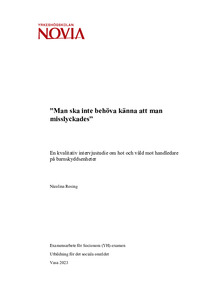"Man ska inte behöva känna att man misslyckades": en kvalitativ intervjustudie om hot och våld mot handledare på barnskyddsenheter
Rosing, Nicolina (2023)
Rosing, Nicolina
2023
All rights reserved. This publication is copyrighted. You may download, display and print it for Your own personal use. Commercial use is prohibited.
Julkaisun pysyvä osoite on
https://urn.fi/URN:NBN:fi:amk-2023121135985
https://urn.fi/URN:NBN:fi:amk-2023121135985
Tiivistelmä
Hot och våld i arbete med barn och ungdomar inträffar på flera platser nästintill dagligen, men det talas inte avsevärt mycket om det. Därför är målsättningen i denna studie att ta reda på hur handledare som jobbar på barnskyddsenheter hanterar hot-och våldsamma situationer samt hur de i det dagliga arbetet förebygger sådana händelser innan de bryter ut. Den psykiska hälsan och känslomässiga påverkan hos professionella inom området är en viktig aspekt för mig att lyfta, då det är av stor betydelse att veta vilken form av stöd och hjälp man är berättigad att få då man blivit utsatt. Tyvärr blir ämnet lätt normaliserat men hot och våld är aldrig acceptabelt, oavsett händelseplats eller relation till personen som beter sig hotfullt.
Studien utfördes genom kvalitativ metod samt genom teoretiska studier om bland annat metoden lågaffektivt bemötande, människans reaktioner på hot och våld samt olika beteendeformer vid problematiska situationer.
De kvalitativa intervjuerna i resultatredovisningen genomfördes med fyra respondenter som har kunskap och erfarenhet av ämnet, samtliga respondenter arbetar inom området barnskydd i Finland eller Sverige.
Resultatet visar att lågaffektivt bemötande oftast används som metod för att arbeta förebyggande, det fungerar ofta men inte alltid. Att skapa goda relationer till barnen och ungdomarna, bry sig och utstråla pålitlighet är viktigt för ett gott samarbete sinsemellan och många svåra situationer kan undvikas tack vare det. Resultatet visar även hur viktigt det är att personalgruppen har tillgång till, och blir informerade om, stödinsatser och är duktiga på att samarbeta i kollegiet. Threats and violence in work with children and young people occur in several workplaces almost daily, but it’s not often recognized. Therefore, the aim of this study is to find out how mentors working at child protection units handle offensive situations and how they in the daily work prevent such incidents before they occur. The mental health and the emotional impact on professionals in the field are important aspects for me to highlight, as it is of great significance to know what kind of support and help you are entitled to receive when you have been exposed. Unfortunately, the subject is easily normalized, but threats and violence in working with children is never acceptable, regardless the place of the incident or the relationship to the person who act violently.
The study was conducted through a qualitative method and through theoretical studies on low arousal approach, people’s reactions to threats and violence and different forms of behavior in problematic situations. The qualitative interviews were conducted with four respondents who have knowledge and experience of the subject. All respondents work in the field of child protection in Finland or Sweden.
The results show that low arousal approach is the most used method for working preventively, it is often successful, but not always. Creating good relations with the children, a caring environment and to radiate reliability are important factors in avoiding difficulties. The results also show how important it is that the staff group has access to, and is informed about, the support measures. It is also important that there is a functional teamwork in the group.
Studien utfördes genom kvalitativ metod samt genom teoretiska studier om bland annat metoden lågaffektivt bemötande, människans reaktioner på hot och våld samt olika beteendeformer vid problematiska situationer.
De kvalitativa intervjuerna i resultatredovisningen genomfördes med fyra respondenter som har kunskap och erfarenhet av ämnet, samtliga respondenter arbetar inom området barnskydd i Finland eller Sverige.
Resultatet visar att lågaffektivt bemötande oftast används som metod för att arbeta förebyggande, det fungerar ofta men inte alltid. Att skapa goda relationer till barnen och ungdomarna, bry sig och utstråla pålitlighet är viktigt för ett gott samarbete sinsemellan och många svåra situationer kan undvikas tack vare det. Resultatet visar även hur viktigt det är att personalgruppen har tillgång till, och blir informerade om, stödinsatser och är duktiga på att samarbeta i kollegiet.
The study was conducted through a qualitative method and through theoretical studies on low arousal approach, people’s reactions to threats and violence and different forms of behavior in problematic situations. The qualitative interviews were conducted with four respondents who have knowledge and experience of the subject. All respondents work in the field of child protection in Finland or Sweden.
The results show that low arousal approach is the most used method for working preventively, it is often successful, but not always. Creating good relations with the children, a caring environment and to radiate reliability are important factors in avoiding difficulties. The results also show how important it is that the staff group has access to, and is informed about, the support measures. It is also important that there is a functional teamwork in the group.
